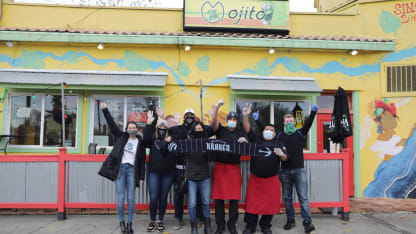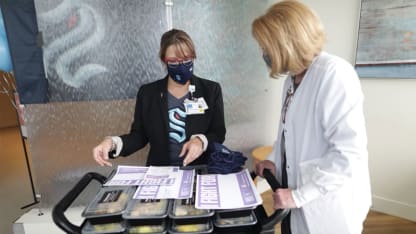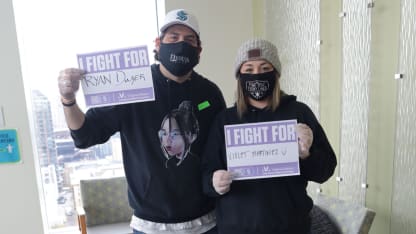The arc of kindness in this story begins with a dad, daughter, uncle and a local rugby club. It continues with a Seattle restauranteur and one customer who didn't want the business to fail during the COVID-19 pandemic. Next, the kindness arches toward cancer care units at Virginia Mason Hospital and Seattle Medical Center for a "Hockey Fights Cancer" event staged by the Kraken and founding partner Virginia Mason.
The dad, Ryan Dwyer, was diagnosed with leukemia in 2019. His daughter, Violet Martinez, 12, was treated for cancer, too. She's now in remission from Non-Hodgkin's lymphoma. Dad and Violet decided to start a nonprofit, Fine Dine Front Lines, to provide meals to the cancer workers at the two separate hospitals where they were treated during 2019. It has since expanded statewide to provide delicious nourishment to front-line health care workers with more than 10,000 meals to be served by year's end if not sooner.
In-Kind Appreciation
Local "Hockey Fights Cancer" event show giving back and paying it forward is deeply rewarding for both the givers and receivers. Consider it a circle unbroken
Seattle Kraken provide meals to front line workers
Dwyer is currently hospitalized after undergoing a bone-marrow transplant. That's why his brother, Sean, Violet's uncle was affixing Fine Dine Front Lines stickers to microwaveable containers of a braised chicken (with onions, lime and cilantro), fresh steam vegetables and yellow rice (doused with turmeric) this past Wednesday morning at the Mojito restaurant. He is filling in while his brother waits for encouraging news on his body accepting a donor's graft of T-cells, which, happily was reported as looking likely earlier that same day.
"It started out with Ryan and Violet packing meals for hospital workers who treated them] into the car and delivering them," says Ryan in Mojito's industrial kitchen, which is in full gear turning out 100 meals. "When COVID-19 hit, we saw the opportunity to scale it up. We plan to keep doing it as long as the contributions keep coming in [you can donate at
[www.finedinefrontlines.com
]."

As part of scaling up Fine Dine Front Lines, members of the Seattle Rugby Club (#RugbyCares) volunteer to deliver the nonprofit's meals. Scott Dean, a member of the club who also plays for the Seattle Seawolves rugby team, organizes the volunteers and interacts with participating restaurants, which get a needed boost in business: "I work with lots of restaurants from month to month. We typically will use one restaurant for a whole week-Monday, Wednesday, Friday-which equates to 250 to 300 meals."
Side note: Ryan Dwyer was laid off in March from a restaurant supplier job, but it didn't stop the Fine Dine Front Lines movement: "I could either sit and do nothing while I battle cancer (like I did the previous year) or I could do something to make a difference and occupy my mind," Ryan Dwyer told King 5 News earlier this year.
All of which leads to an assumption Luam (pronounced "Loo-um") Wersom is Latino. While he speaks fluent Spanish, Wersom was born in Ethiopia to parents who are Eritrean. Eritrea is an East African nation that shares borders with Ethiopia, Sudan and Djibouti. Wersom is fluent in Tigrinya, spoken in Eritrea and northern Ethiopia in the Tigray region. His language skills are even more impressive with fluency in Greek learned during four years in a refugee camp in the European country before his parents immigrated to the U.S. The family was sponsored by a church in Texas and made their way to Seattle where his dad worked at a gas station and his mother still works at Fircrest School, which supports about 200 people with intellectual and development disabilities in a residential setting.
Wersom's Mojito restaurant is in a building that is nearly 100 years old and, poetically enough, was first a gas station in 1922. Twenty-one years ago, a 19-year-old Wersom helped with the converting the space into Mojito, even helping construct the tables still used at the restaurant today. When the restaurant opened, Wersom shifted to a dishwasher role. He worked his way into the cooking line and earned the opportunity to own Mojito with partners. He bought out his last partner a year ago.
"Customers ask me about moving to a bigger place," says Wersom during an interview (check out our "bonus" with this article). "But I feel like this is like a community center. I plan to stay."

Mojito has many loyal customers who have been arriving from near and far for takeout and outdoor/indoor dining, including those Seattleites missing a taste of their home countries and neighborhood families who order Mojito's rice and beans to go for pairing with meals at home for the week. One customer didn't want Wersom to face closure when COVID-19 threatened the business; he offered to write a check for the owner-chef and his wife and Mojito partner Lindsey. "I said, 'No, I can't take a handout, I want to do something for it,' " recalls Wersom.
That something turned out to be a program with the King County Housing Authority to cook meals for low-income seniors every Monday and Wednesday, with Wersom himself driving the meals to various KCHA locations. There was deeper meaning in the work for Wersom; he lived in Ballinger Commons in Shoreline as a teen, now one of his delivery locations. In fact, a number of his Shorecrest High teachers are regular diners who have sent cards and checks when they learned of senior meals outreach. Wersom cooks the food with less salt and lots of fresh vegetables, plus packs the weekly meals in microwaveable containers knowing many seniors won't eat the entire generous portion in one sitting.
Wersom has continued the program out of his own pocket: "I couldn't stop doing it," he says. "We are looking at ways to fund it."
His community-first approach is not new. He has cooked for Mary's Place, a homeless shelter for women and families. He roasts turkeys for the homeless at Thanksgiving and has worked with the King County Housing Authority in past years to help feed nutritious foods to kids. His wife Lindsey, who met Wersom in this kitchen space working as a caterer, is in the middle of the all of the preparation but prefers her husband stand in the spotlight: "We do what we can," she says, "We're still here."
By 10:30 last Wednesday morning, the 100 meals with placed in to-go containers, stickered and loaded into a giant warming case. The Kraken footed the bill for the food prep and delivery with a $1,000 check, designating the chicken-yellow rice-and-vegetables lunches for cancer care workers at Virginia Mason, one of the team's founding partners and co-leader of the appreciation event during the NHL's "Hockey Fights Cancer" month. An hour later, representatives from cancer arrived at the 18th floor break room of Jones Pavilion in timed increments to pick up meals for their co-workers. Everyone got a lunch, healthy drink and a custom "Hockey Fights Cancer" mask that fans can purchase at
www.seattlekrakenmasks.com
.

The Virginia Mason nurses and managers were clearly touched by the event, which included socially distanced banter and more than a few smiles. Stephanie Hubbard is a registered nurse who works with pancreatic cancer patients, getting them ready for treatment and also playing a role in the survivorship clinic once the treatment is finished. There are good days and rough days on the job.
"You have to remember those good days and reason why we are all here is to help our patients," says Hubbard, who will soon wheel a couple dozen meals to colleagues and noted she looks forward to going to a future Kraken game with her children. "It feels amazing [to be appreciated by the lunches]. It keeps you going when people recognize the work. We don't do it for that reason but it always helps."
Michele Portillo was first on the scene to pick up workers meals on Virginia Mason's inpatient oncology unit, which comprises most of the Jones 18th floor. She explains what keep her and everyone going during twelve-and-a-half shifts.
"To be bedside with patients is so rewarding to the staff," says Portillo, assistant nurse manager. "We have a very dynamic, supportive team at Virginia Mason, wonderful patients who are joy to work with, plus supportive families too. I have been here 21 years and see more longevity for myself and couldn't do it without the support from family and staff."
Turns out that arc of kindness might be a full circle after all.


















